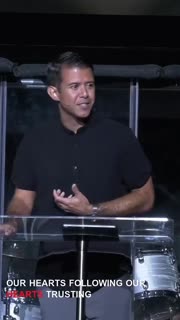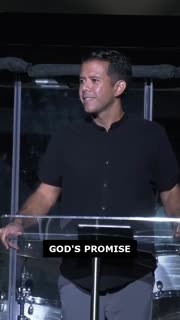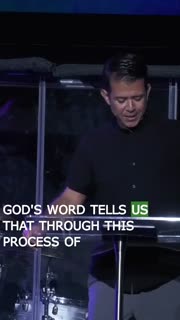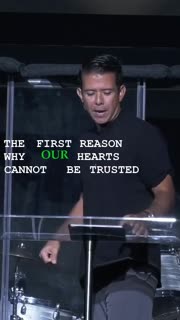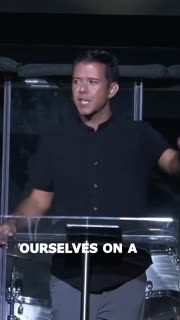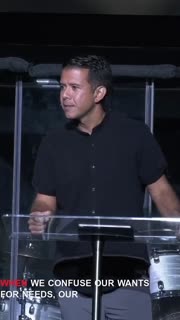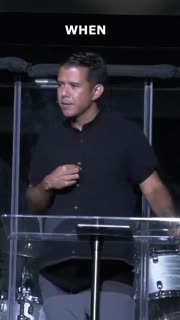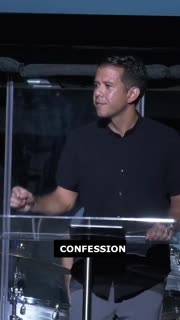Transforming Hearts: Navigating Sexual Desires in Faith
Devotional
Sermon Summary
Bible Study Guide
Sermon Clips
### Quotes for Outreach
1. "When Adam and Eve turned from God, they decided to send their lives around the desires of what? Their heart. And ever since then, we've been doing the same exact thing, putting ourselves, putting our own desires at the center of our own world. That's why part two of this discussion is all about looking inside of ourselves. Because what we ultimately need is for God to expose those desires that lie deep within our hearts. And we need for him to give us a new heart." [05:09] (27 seconds)
2. "Listening to our hearts, following our hearts, trusting them, it's not the way to find freedom from sexual sin. It's not the way to have power over sexual temptation. No, the only way that you or I can find that freedom is by receiving a new heart. It's by receiving a new heart and the good news is family one has already been promised to us." [15:26] (19 seconds)
3. "Those who truly love you will be eager to sacrifice for you. They'll be willing to wait for you. They'll be willing to serve you. Those who simply desire you will expect you to sacrifice for them." [12:42] (12 seconds)
4. "God's promise remains true. I will give you a new heart, He says. Are you ready to receive it? I want to ask you, if you would, just bow your heads and close your eyes right where you're at. Those of you who are here and feeling that conviction, that tug of the Holy Spirit. You may not even be able to really verbalize what that feels like right now, but you know that you need to confess and to repent." [30:30] (32 seconds)
5. "God's Word tells us that through this process of prayer and of confession and of repentance, that we are being transformed. Not that we might be transformed, not that we will be transformed, but that we are being transformed into the image of Christ. That's what that means. That even though we may feel like we are in the midst of a battle, that breakthrough is coming. Breakthrough is coming because God's promise is true." [32:25] (26 seconds)
### Quotes for Members
1. "The first reason why our hearts cannot be trusted is that our hearts often mistake wants as needs. Our hearts often mistake wants for needs. This simple truth is what's led to just about every addiction ever. Okay? It is a belief. That is often a result of a repeated behavior that tricks our brains into thinking that this thing that we once wanted is now actually needed for our survival." [06:23] (24 seconds)
2. "When we mistake our want for sex as a need for sex, we set ourselves on a path towards destruction. And it's not because sex is a bad thing. We talked a lot last week about sex being a good thing. But even a good thing can become a bad thing when that good thing becomes a ruling thing in our hearts. We become to depend on it." [07:37] (60 seconds)
3. "When we confuse our wants for needs, our desires, they turn into demands. Demands that we then place onto others. Often with that very same, motivation to have that need filled. And this is why our hearts cannot be trusted. Because they'll turn our desires into demands. And those demands can and have and will result in the pain and the suffering and the struggles that we've been talking about throughout this series." [10:11] (25 seconds)
4. "When expectations turn to entitlement is when you start seeing the blame shifted for sexual sin see it's never the fault of the person it's always the fault of the people around them because they didn't get what was owed to them right they didn't get what they felt like they deserved so they shift the blame on others this is why you'll hear things like well you know she was asking for it with the way that she dressed." [14:01] (24 seconds)
5. "Confession without course correction is empty words. It's like the New Year's resolutions we make. Unless there's actually action that follows, it's just hollow words, meaningless things. See, family, when we confess, we admit that what we did was wrong, that what we did was sinful, that it went against God's design, His plan, His desire for our life. But when we repent, we choose to turn from that sin, and we choose to chase after the things of the Lord." [29:04] (30 seconds)
Ask a question about this sermon
1. "When Adam and Eve turned from God, they decided to send their lives around the desires of what? Their heart. And ever since then, we've been doing the same exact thing, putting ourselves, putting our own desires at the center of our own world. That's why part two of this discussion is all about looking inside of ourselves. Because what we ultimately need is for God to expose those desires that lie deep within our hearts. And we need for him to give us a new heart." [05:09] (27 seconds)
2. "Listening to our hearts, following our hearts, trusting them, it's not the way to find freedom from sexual sin. It's not the way to have power over sexual temptation. No, the only way that you or I can find that freedom is by receiving a new heart. It's by receiving a new heart and the good news is family one has already been promised to us." [15:26] (19 seconds)
3. "Those who truly love you will be eager to sacrifice for you. They'll be willing to wait for you. They'll be willing to serve you. Those who simply desire you will expect you to sacrifice for them." [12:42] (12 seconds)
4. "God's promise remains true. I will give you a new heart, He says. Are you ready to receive it? I want to ask you, if you would, just bow your heads and close your eyes right where you're at. Those of you who are here and feeling that conviction, that tug of the Holy Spirit. You may not even be able to really verbalize what that feels like right now, but you know that you need to confess and to repent." [30:30] (32 seconds)
5. "God's Word tells us that through this process of prayer and of confession and of repentance, that we are being transformed. Not that we might be transformed, not that we will be transformed, but that we are being transformed into the image of Christ. That's what that means. That even though we may feel like we are in the midst of a battle, that breakthrough is coming. Breakthrough is coming because God's promise is true." [32:25] (26 seconds)
### Quotes for Members
1. "The first reason why our hearts cannot be trusted is that our hearts often mistake wants as needs. Our hearts often mistake wants for needs. This simple truth is what's led to just about every addiction ever. Okay? It is a belief. That is often a result of a repeated behavior that tricks our brains into thinking that this thing that we once wanted is now actually needed for our survival." [06:23] (24 seconds)
2. "When we mistake our want for sex as a need for sex, we set ourselves on a path towards destruction. And it's not because sex is a bad thing. We talked a lot last week about sex being a good thing. But even a good thing can become a bad thing when that good thing becomes a ruling thing in our hearts. We become to depend on it." [07:37] (60 seconds)
3. "When we confuse our wants for needs, our desires, they turn into demands. Demands that we then place onto others. Often with that very same, motivation to have that need filled. And this is why our hearts cannot be trusted. Because they'll turn our desires into demands. And those demands can and have and will result in the pain and the suffering and the struggles that we've been talking about throughout this series." [10:11] (25 seconds)
4. "When expectations turn to entitlement is when you start seeing the blame shifted for sexual sin see it's never the fault of the person it's always the fault of the people around them because they didn't get what was owed to them right they didn't get what they felt like they deserved so they shift the blame on others this is why you'll hear things like well you know she was asking for it with the way that she dressed." [14:01] (24 seconds)
5. "Confession without course correction is empty words. It's like the New Year's resolutions we make. Unless there's actually action that follows, it's just hollow words, meaningless things. See, family, when we confess, we admit that what we did was wrong, that what we did was sinful, that it went against God's design, His plan, His desire for our life. But when we repent, we choose to turn from that sin, and we choose to chase after the things of the Lord." [29:04] (30 seconds)

